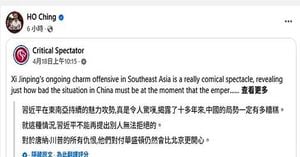UK inflation has unexpectedly eased to 2.8% for the 12 months leading up to February 2025, according to the latest data released by the Office for National Statistics (ONS) on March 26. This marks a decrease from the previous month’s rate of 3%, and significantly lower than the 2.9% that analysts had anticipated. The decline in inflation is attributed primarily to a drop in the prices of women’s clothing, which have seen their first fall in over three years.
The inflation figures come ahead of Chancellor Rachel Reeves’s Spring Statement, where she is expected to address the nation regarding economic conditions and potential spending cuts. The latest data will likely provide some relief for Reeves and the Bank of England (BoE), as they navigate a challenging economic landscape.
In February, core inflation, which excludes volatile items such as food and energy, remained stubbornly high at 3.5%, down slightly from 3.7% in January. This persistent core inflation raises concerns about the overall economic health of the UK, as it remains well above the BoE’s target of 2%.
Investment commentators have voiced apprehensions about the current economic climate. Lindsay James, an investment strategist at Quilter, highlighted the “cocktail of risks” that could lead to stagflation, a combination of stagnant economic growth and high inflation. “With Rachel Reeves up at the despatch box later today to reassure not only investors, but the nation that the economy is doing just fine, today’s inflation figures are a reminder of what lurks ahead,” James stated.
The challenges facing the UK economy are compounded by rising energy prices and the potential for sudden shocks in the global economy. Jonny Black, chief client experience officer at Aberdeen Adviser, warned that while inflation may have dipped, the road ahead is fraught with uncertainty. “The Bank of England still expects inflation to peak at 3.7% by summer,” he noted, emphasizing the need for investors and savers to remain vigilant.
The monthly Consumer Price Index (CPI) inflation rebounded to 0.4% in February, compared to a slight decline of -0.1% in January, although this was below the 0.5% forecast by analysts. The slight increase in monthly inflation reflects ongoing pressures in the economy, particularly in the housing sector and the prices of alcoholic beverages, which saw an uptick following recent tax increases.
Despite the drop in overall inflation, the cost of living remains a pressing concern for many households across the UK. The first decline in clothing prices since October 2021 was a significant factor in reducing the inflation rate, with women’s clothes and children’s clothing contributing to this decrease. The ONS reported a 0.6% fall in overall prices for clothing and footwear in the year leading to February.
Grant Fitzner, chief economist at the ONS, commented on the inflation figures, saying, “Inflation eased in February. Clothing prices, particularly for women’s clothes, were the biggest driver for this month’s fall.” He also noted that while housing inflation, including rents, slowed, other areas such as alcohol and tobacco experienced price increases.
As the Chancellor prepares for her Spring Statement, the economic outlook remains uncertain. Analysts expect Reeves to announce spending cuts for various government departments in response to weaker economic growth projections from the Government’s official forecaster. This could further impact the living standards of working people, a concern voiced by Chief Secretary to the Treasury Darren Jones, who stated, “Our number one mission is kickstarting growth to raise living standards for working people.”
The inflation report is expected to influence the Bank of England’s monetary policy decisions in the near future. Earlier this month, the BoE held interest rates at 4.5%, but the recent inflation data may prompt a re-evaluation of this stance. The market is currently pricing in expectations for potential interest rate cuts, but the recent inflation figures could alter these predictions.
The UK’s economic landscape is complex, with inflation remaining a critical issue as the government navigates through fiscal challenges. The combination of falling inflation rates and persistent core inflation presents a unique dilemma for policymakers, who must balance the need for economic growth against the risks of rising prices.
As the nation awaits Chancellor Reeves’s Spring Statement, the implications of these inflation figures will be closely scrutinized by economists, investors, and the public alike. The government’s response to the current economic conditions will be pivotal in shaping the UK’s financial future and the well-being of its citizens.







